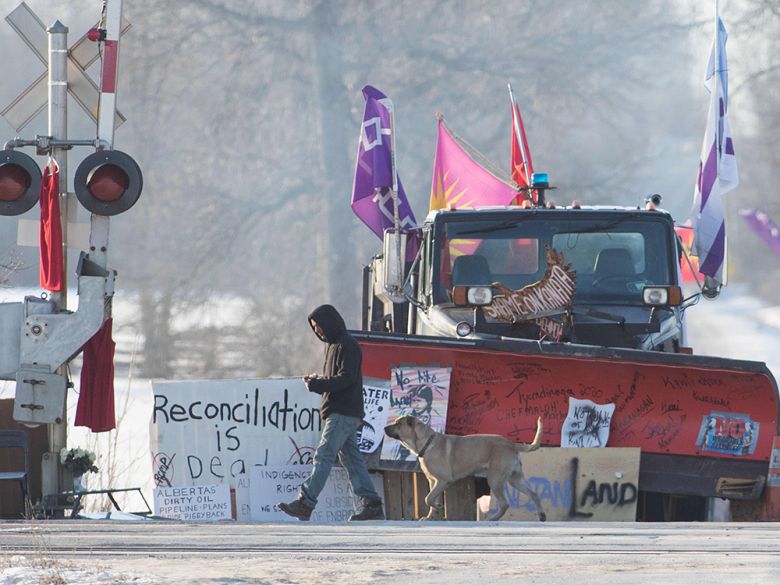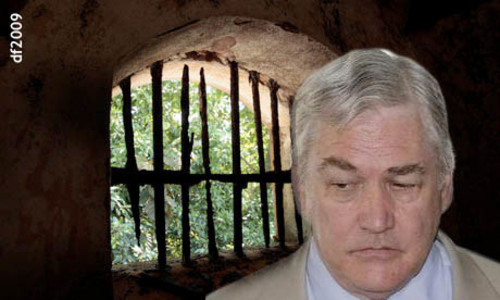Because of my frequent criticism of the present federal government’s Indigenous and climate change policies, which along with posturing about matters relating to gender are the principal preoccupations of this regime, I have withheld comment about the ongoing rail blockades here and with my friend John Oakley on CFMJ (Toronto), an AM radio station. The problem has festered for two weeks as the federal government fumbles and obfuscates, passes the buck to the provinces and calls for “patience.” It is now the most absurd fiasco to afflict a Canadian government since John Diefenbaker announced in January 1963 that at the meeting of U.S. president John F. Kennedy and British prime minister Harold MacMillan in the Bahamas a week before (which Diefenbaker crashed), there had been “a change in the views of NATO” about nuclear weapons, and Canada would not honour its commitment to deploy atomic warheads in anti-aircraft missiles.
He had pledged to this deployment (with a dual firing authority — the government of Canada and the NATO command both had to approve use). This was a breach of faith with our principal allies and the alliance system that assured Canada’s security. It was a monstrous falsehood about what Kennedy and MacMillan agreed, was unutterable nonsense in straight military terms (without such warheads, the Bomarc missile would have had warheads of sand). The government fell, the Liberals under Lester B. Pearson came into office, and the warheads were deployed.
The problem has festered for two weeks as the federal government fumbles and obfuscates
The present impasse over the blockades in sympathy with some Indigenous opposition to the Coastal GasLink natural gas pipeline in northern British Columbia is comparably absurd, and although it does not directly involve Canada’s relations with other countries, it is now bringing us into widespread contempt and ridicule in the world. The federal government’s sanctimonious fumbling and posturing is despised by everyone: the First Nations, the majority of Canadians and international opinion, as the prime minister beseeches support for Canada’s elevation to two years on the United Nations Security Council. To refresh memories, the majority of the Wet’suwet’en natives, five of six elected native councils among 20 native councils along the 670-kilometre pipeline, support the project. These are the leaders in the specific reservations. Five Wet’suwet’en hereditary chiefs, who govern larger territories, are opposed. In sympathy with the opposing Wet’suwet’en, but contrary to the majority of them and contrary to the other 15 native councils along the proposed route from Dawson Creek to Kitimat, protesters, a mix of Indigenous and non-Indigenous citizens, are blocking rail traffic for cargo and passengers at many points in B.C., Alberta, Ontario, Quebec and New Brunswick, and scattered other places. Nearly one hundred thousand Via rail passengers have been terribly inconvenienced, as well as many thousands of motorists and local commuters who have been blocked or forced into lengthy detours, and thousands of freight trains involving billions of dollars of commerce have been cancelled or lengthily delayed.
It is bringing us into widespread contempt and ridicule in the world
These blockades have now adversely affected the entire country. This project is a matter of distinct national interest unequivocally supported by the NDP-Green government of British Columbia, and is being harassed by these blockades in defiance of more than a score of court orders across the country, and is illegally holding the entire country to ransom. Before discussing the issue, the hereditary Wet’suwet’en chiefs, representing a few thousand people, demand that the RCMP (under provincial control in B.C.) withdraw from what the blockaders claim to be native land. The implications of this stance are clearly that Canada has no authority on what they call their land, a definition about which there is a considerable difference between the leaders of the blockade and their sympathizers and the government of Canada. This is, in effect, secession from the authority of Canada while continuing to demand increased financial benefit from Canada. It is another step in the campaign I have often decried, of the more militant Indigenous leaders to claim not only that Canada has no authority on their present designated territory, but is an illegitimate invader and occupier of their territory.
This is, in effect, secession from the authority of Canada
Faced with the refusal of the blockaders to pay any attention to court orders that they desist, the federal government has waffled about its right or obligation to use or encourage force to stop these illegal blockades. Justin Trudeau and his officials have uttered a good deal of unctuous claptrap about Ottawa having no standing to tell police forces, even the federal RCMP, how, or even whether, to enforce the law and defend the economic life of the country from these illegal actions by people who have no legitimate interest in the pipeline. The blockaders claim they are fighting a historic battle for withheld recognition, the beginning of the slippery slope toward the notion of an Anglo-French invasion of Canada displacing and enslaving the real Canadians.
In one sense, it is unjust to blame even these unrepresentative extremists for pushing on an open door. All Trudeau’s pious bunk about “nation-to-nation” transacting between the federal government and the native leaders invited them to consider that they had equal sovereignty with Canada. And if the principle that some of Canada could be considered independent and possessed of a sovereign right, logically, takes hold, all the natives are independent of Canada, and Canada belongs to them.

Governments have the whole responsibility and duty to make and enforce laws. Indigenous affairs are a federal priority jurisdiction, and inter-provincial transport, including railways and pipelines, are federal jurisdictions. The federal government has an unconditional duty to protect the rights of those whose interests are imperilled by illegal activity. There is no possible excuse for the federal government tolerating the development of this crisis as it has. There is no right to strike against the national interest, especially when every manifestation of this lawless blockade policy has been condemned by courts. Instead of the assertion of the eminent domain of the national interest and the rule of law, we have Public Safety Minister Bill Blair (on the heels of his shambles of marijuana legalization), saying that federal police is willing to withdraw from Wet’suwat’en territory. Transport Minister Marc Garneau tried handing his responsibility off to the provinces (all of whom want the blockades stopped) and the prime minister claims to have no standing to tell the police what to do.
Governments have the whole responsibility and duty to make and enforce laws
It is the complete collapse of the spurious and corrupt Indigenous policy of this government and the outright abdication of the government itself. If it is not the federal government’s purpose to uphold laws and defend the national interest against illegal sabotage of public policy, and so defined by many courts across the country, what is the purpose of the government? If it won’t govern, we should dispense with it — “Have done with this rubbish of a state,” in the words (admittedly in a radically different context and with questionable sincerity) of Stalin. Erin O’Toole, Conservative MP and leadership candidate, has rightly called for the use of whatever force is necessary (it would be minimal) to end the blockades, and of course he is correct.
I wrote here before the election last October that this government was in office but not in power; that condition has steadily worsened.
• Email: cmbletters@gmail.com






























